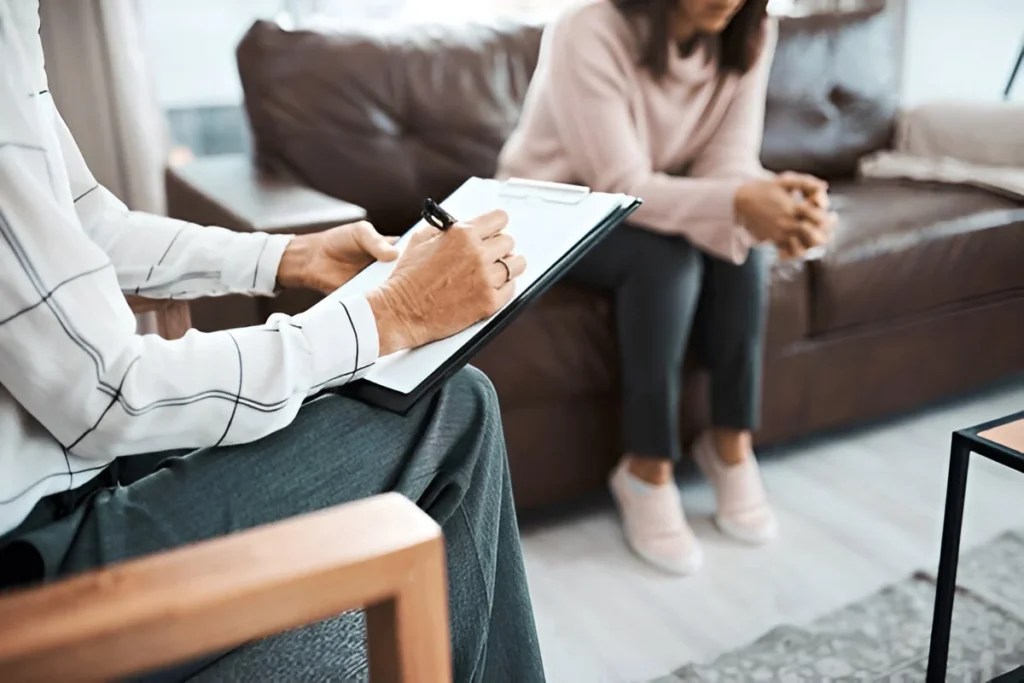There’s a unique kind of heartbreak that comes with losing someone who’s still alive.
One moment, they were a part of your everyday—your routines, your future plans, even the way you saw yourself. Then all of a sudden, they were gone. Not because they died, but because they chose to be apart, or, to move, or change.
Breakup grief is real. It’s not just sadness—it’s disorientation, emotional withdrawal, and sometimes, silence where there used to be love. And it comes in waves, just like any deep loss.
Understanding the 7 stages of grief after a breakup won’t take the pain away, but it will help you name what you’re feeling. This isn’t about rushing into “getting over it.” It’s about walking through the fog at your own pace, with compassion and clarity—so you can eventually come back home to yourself.
Key Takeaways
- Breakups trigger a range of emotions that follow specific stages.
- Understanding the seven stages makes it easier to manage your feelings.
- Healing from a breakup takes time, but support and healthy habits can help.
Why Breakup Grief Hits So Hard
Losing a relationship is different from most other types of loss because it can affect your emotions, brain chemistry, and daily habits all at once. This kind of grief often feels overwhelming and confusing, but there are real reasons why it’s so intense.
Emotional Loss vs. Physical Loss
When you go through a breakup, what you lose isn’t always visible. You’re not just grieving a person, but also the shared experiences, routines, and dreams for the future you had together.
Emotional loss can sometimes feel worse than physical loss because it isn’t as easy to name or process. Physical loss, like death, tends to be understood and supported by those around you, but with a breakup, people might expect you to “move on” quickly.
This can create a feeling of isolation. The end of a relationship often means losing social connections, traditions, and comfort, all at once.
Your Brain on Heartbreak
After a breakup, your brain reacts much like it would to withdrawal from an addictive substance. Activities in areas tied to motivation, craving, and emotional regulation ramp up, which is probably why you can’t stop thinking about your ex-partner or replaying old conversations.
Studies show that heartbreak activates the same neural pathways as physical pain. That’s why grief after a breakup can actually feel physically painful.
You may notice changes in appetite, sleep, or focus. Your brain is trying to adjust to the sudden absence of someone important, and it’s tough.
Learn more about the science behind heartbreak at Psychology Today.
How Breakup Grief Mirrors Traditional Grief—And How It Doesn’t
Grieving after a breakup often follows many of the same steps as traditional grief: denial, bargaining, anger, depression, and acceptance. But breakup grief is different because your former partner is still alive, and you might run into them, which can reopen old wounds.
Unlike other losses, breakups can come with unanswered questions or regrets that make it harder to find closure. The process can get unpredictable, bringing sudden waves of sadness, anger, or hope.
The 7 Stages of Grief After Breakup (And What They Really Feel Like)
Going through a romantic relationship breakup can bring up many emotions. Each stage of grieving a breakup plays a different role in how you heal after a loss and grow as a person.
1. Shock and Numbness
Right after the breakup, there can be intense emotional pain. You might feel numb, shocked, or disconnected. It can seem unreal, almost like your mind is shielding you from pain.
You might go through your daily routine without really thinking, like you’re on autopilot. It’s common to question if the relationship is really over.
Friends and family may try to comfort you, but their words feel distant. You could have trouble eating, sleeping, or focusing.
2. Denial and Disbelief
Denial gives you a break from strong emotions. You might refuse to accept the situation, hoping the breakup didn’t actually happen.
You may still talk to your ex or check their social media. Maybe you start to believe things will go back to how they were.
Reading old messages or replaying moments in your mind, you search for signs that things aren’t over. Denial can put you off facing your new reality.
After some time, your mind starts to accept that things have changed, and you slowly face your feelings.
3. Anger and Resentment
Anger often pops up next. You could feel mad at your ex, yourself, or even friends who you think could have helped.
This stage brings strong emotions like resentment and frustration. You might think, “Why did this happen to me?” or “What did I do wrong?”
It’s typical to look for someone to blame, even for things outside your control. Letting yourself feel angry can actually help you move forward—it’s better than bottling it up.
Over time, the anger fades and lets you process other emotions. Anger is a natural stage and doesn’t make you a bad person.
Ways anger can show up:
- Irritability
- Criticizing yourself or your ex
- Feeling misunderstood
4. Bargaining and Obsessive Thinking
During bargaining, you might try to find ways to fix things or get back together. You are not ready to let go. Maybe you think, “If I change this about myself and convince my ex, maybe things will work out.”
You could promise to do anything for another chance. Obsessive thinking often takes over as you look for answers.
You might replay conversations, analyze every detail, or search the internet for advice. Some people reach out to their ex again and again, hoping for a different outcome.
Bargaining rarely changes the outcome, but it’s your mind’s way of trying to avoid pain.
5. Deep Sadness and Depression
Sadness is a very common part of breakup grief. You might feel empty, tired, or lose interest in things you used to enjoy.
This depression phase can make it hard to get out of bed or see friends. Tears may come easily, or you might feel hopeless about the future.
You may wonder if you’ll ever feel normal again. These feelings hurt, but they’re part of healing.
Talking to others, even if you don’t want to, can help you get through these tough days. If the sadness lasts a long time, consider asking a counselor for help.
6. Acceptance and Understanding
Acceptance is where your feelings become less intense. You stop wishing for things to be different and start seeing the breakup for what it is.
You begin to understand your relationship and why it ended. New routines might start to feel normal.
This stage can feel peaceful compared to the earlier steps. You might notice you’re thinking about your ex less and looking more toward the future. This initial acceptance is often a sign you’re reaching the acceptance stage.
7. Growth and Reconnection
The last stage happens when you start to grow from the breakup. You may reconnect with old friends or find new interests.
Life starts to feel full again as you make new plans and move forward. You might feel proud of how you handled a hard time.
There’s a sense of freedom and the chance to build a better version of yourself. Growth and reconnection show real healing and mean you’ve gone through the stages in your own way.
This doesn’t mean you forget your past relationship. Instead, you learn from it, come to understand yourself better, and look forward to what’s next.
Sometimes you even realize you’re stronger than before, which is honestly one of the best parts of healing.
Are These Stages Always Linear?
You might expect to go through the 7 stages of grief in a tidy order, but it rarely works out that way. Feelings repeat, overlap, or change unexpectedly during the healing process.
The Myth of “Moving On” in Order
Many people believe you should heal by moving from one stage to the next, but grief after a breakup almost never happens in a straight line. You might feel angry one week, start to accept things the next, and then suddenly feel denial again.
Some days, you may try to convince yourself you’re over it, only to wake up the next morning refusing to accept what happened. This is normal.
The idea that you pass each stage once, then “move on,” is a myth. Grief can feel like a roller-coaster of emotions, where you circle back to earlier stages or feel several at once.
You’re not doing anything wrong if you don’t follow a set pattern.
What Looping and Emotional Setbacks Really Mean
After a breakup, it’s common to loop through the stages or revisit old feelings. Sudden emotional setbacks don’t mean you’ve failed or are getting worse.
These setbacks are a natural part of how your mind tries to process what happened. If you find yourself feeling stuck in one stage for a while, or if you keep going back to denial or anger, it’s not unusual.
Your brain is just trying to sort out a big change and might need more time.
Remember:
- You might feel fine, then sadness returns.
- Feeling like you’ve made progress, then sliding back, is expected.
- Over time, your lows do get less intense, even if it doesn’t always feel that way.
The key is to give yourself patience and not rush to “get over it” by following a strict order. Emotional setbacks and backtracking aren’t failures but part of the grieving process.
How Long Does It Take to Heal After a Breakup?
The length of time it takes to heal after a breakup depends on several things. Each person’s experience is unique, and how you move on can look different from someone else’s, even if you went through something similar.
Realistic Timelines
There’s no single answer for how long it’ll take to heal. Some people start to feel better in just a few weeks.
For others, it can take several months or even longer. The length of your relationship, how close you were to your ex, and who ended things can all affect your timeline.
Experts often say there’s a general pattern: shorter relationships might take a few months to move on, while more serious or long-term breakups can take a year or more. But honestly, this is just a guideline.
Healing isn’t a race, and comparing yourself to someone else doesn’t really help. It’s also pretty common to go through the stages of heartbreak in waves, sometimes feeling okay and then suddenly sad again.
You may find this process explained in detail at Growing Self Counseling & Coaching.
Factors That Speed Up or Slow Down Healing
Certain things can make healing go faster—or drag it out. If you’ve got friends or family who actually listen and care, you might bounce back a bit quicker.
Talking about your feelings, even if it’s just venting, really does help. Expressing pain, instead of bottling it up, lets your mind start to process what happened.
But if you keep seeing your ex around, or you’re secretly hoping you’ll get back together, moving on usually takes longer. Ignoring your feelings or feeling pressured to “just get over it” seems to slow everything down.
When you didn’t choose the breakup, letting go can feel almost impossible some days. Still, looking after your mental health, eating decent meals, sleeping enough, and staying active all give your body and mind a fighting chance to heal.
Healthy Ways to Cope During Each Stage
Grieving a breakup takes time. All the stages of a breakup bring intense emotions, and it’s okay if some days feel harder than others. These simple actions can help you feel a little more grounded and supported as you go through grieving following a breakup.
Stay Present
Take slow, deep breaths. Go for a short walk. Notice what you see, hear, and touch. These steps can calm your nervous system and ease the physical symptoms of grief.
Be Kind to Yourself
Talk to yourself like you would to a close friend. Set small, personal goals—like making your bed or eating a meal. Allow yourself to feel the sadness and anger without judgment. This is part of the grieving process.
Reach Out
You don’t have to do this alone. Talk to someone you trust. Write your thoughts in a journal, even if they don’t make sense yet. Doing something that brings you comfort—even for a few minutes—can help you through each stage of grief, especially when the pain feels heavy.
Breakup Dos and Don’ts
Dos:
- Let yourself feel your emotions and know it’s okay to grieve.
- Set small goals each day, like taking a shower or going for a quick walk.
- Try hobbies—new or old—that give you a little joy.
Don’ts:
- Don’t rush yourself or expect to feel better right away.
- Stay away from unhealthy habits like too much drinking, cutting off all friends, or endlessly checking your ex’s social media.
- Don’t blame yourself or pretend you don’t need support.
Breakup Grief vs. Clinical Depression: Know the Difference
Breakups bring sadness, but sometimes your feelings or behavior change in ways that need extra attention. There are some clear differences between normal heartbreak and clinical depression, especially if it’s affecting your everyday life.
When Grief Becomes Something More
Normal breakup grief comes in waves. Some days feel lighter, others hit harder.
You might lose sleep, get irritable, or question yourself a lot. Usually, these feelings fade as you start to process what happened.
Clinical depression is another story. The sadness goes deep, sticks around most of the day, and can last for weeks or longer.
You might lose interest in things you used to love, and even simple tasks can feel impossible. Physical symptoms like appetite changes or sleeping too much—or barely sleeping at all—can show up too.
If daily life feels unmanageable, it could be more than just breakup grief.
Signs It’s Time to Seek Professional Support
If your sadness just won’t lift, or you find yourself thinking about death, self-harm, or feeling hopeless most of the time, please reach out for help. Feeling numb, losing interest in hobbies, or struggling to get out of bed are all warning signs.
Physical symptoms like headaches, stomach issues, or constant fatigue that don’t go away? Those can point to depression, too.
Low self-worth, strong guilt, or a lot of self-doubt often mean you’re dealing with something deeper. If friends or family say you seem withdrawn or different, pay attention to their concerns.
A therapist or counselor can help you figure out what’s going on and support you. If things feel out of control, don’t wait—help is out there.
How Therapy Can Help You Process Breakup Grief
Therapy offers a safe place to talk about your feelings and learn new ways to cope with breakup pain. A therapist helps you understand your emotions so you can start to heal in a healthier way.
Therapy Modalities That Work (CFT, CBT, EFT, etc.)
Several types of therapy can help with breakup grief. Cognitive Behavioral Therapy (CBT) challenges negative thinking and helps you see things more clearly.
Emotion-Focused Therapy (EFT) lets you express feelings and ease emotional pain.
Compassion-Focused Therapy (CFT) teaches you to be gentle with yourself, especially when you feel alone.
Acceptance and Commitment Therapy (ACT) helps you accept what you can’t change and build a life that still feels meaningful.
These approaches use practical tools, like journaling or role-playing, to help you move forward.
Benefits of Individual vs. Group Therapy
Individual therapy: You get one-on-one time with your therapist, which lets you dig into your personal emotions. It’s private, so you might feel safer sharing honestly.
Many people find it easier to open up and ask questions in these sessions.
Group therapy: You meet others who are also dealing with heartbreak. Being around people who understand can make you feel less alone.
Group sessions offer support, fresh ideas, and tips from people who’ve been there. Sometimes hearing how others have coped makes recovery seem more possible.
Both types teach you ways to handle stress and loneliness. Which you choose depends on what feels right for you.
Finding the Right Therapist for Heartbreak Recovery
Look for a therapist who knows breakup grief or relationship counseling. Ask about their experience with CBT, EFT, CFT, or ACT so you know they use proven methods.
It’s important to find someone you actually feel comfortable with—trust makes honest conversations possible.
Many therapists offer a free first session so you can see if you’re a good fit. You should feel safe, heard, and accepted.
Try searching for therapists who mention breakup or grief in their online profiles, like those on The Compassion Practice.
Be patient with the process. The right fit really does make a difference in how you heal.
Final Thoughts: Getting Over a Breakup
The pain that follows a breakup is real. Whether you’re stuck in the denial stage, deep in the sadness, or looping back through anger and bargaining, know this: your feelings are valid, and they won’t last forever.
You may grieve differently than others. Some days will feel like progress, and others like setbacks. That’s all part of the grieving process. You’re not doing it wrong—you’re healing in your own way.
If you’re finding it hard to move forward or feel like you’re carrying too much, you don’t have to keep going alone. Talking to a therapist can help you understand your feelings, manage intense emotions, and rebuild after loss, especially after a relationship breakup.
At The Compassion Practice, we’re here to support you through every stage of grief after a breakup or divorce. Whether you’re navigating heartbreak, self-doubt, or just trying to get through the day, our therapists offer care rooted in self-compassion, clarity, and real connection.
You deserve to heal. Let’s take the next step—together. Get in touch with us; call (347) 658-5402 to start.
Frequently Asked Questions About the 7 Stages of Breakup Grief
Q. Can the Person Initiating the Breakup Also Experience Stages of Grief?
Yes, even if you’re the one who ended things, you can still feel loss, sadness, or regret. Believing it was the right choice doesn’t mean it’s painless.
Both people in a breakup can go through the stages of grief, just maybe in different ways.
Q. How Do the Stages of Grief Manifest Differently in Men and Women?
Everyone grieves in their own way. Some studies suggest men might hide sadness or avoid talking about their feelings.
Women, on the other hand, often reach out for support or talk more openly with friends. These differences don’t mean one approach is better; they just show how people handle pain and emotional stress in their own style.
Q. Can I Skip a Stage?
You might not experience every stage of grief. Some stages come and go quickly, or you might barely notice them at all. It’s common to move back and forth between feelings, or even skip some stages completely.
Q. What if I Still Miss My Ex After a Year?
Missing someone for a long time happens more often than people admit. Healing takes its own pace, depending on your relationship and what’s going on in your life.
If the feelings stick around or start to mess with your daily routine, you might want to talk to a counselor or just reach out to a trusted friend for some extra support.
Q. Is It Normal to Feel Relieved and Sad at the Same Time?
You might feel sad about losing your ex, but also relieved that it’s finally over. These emotions can show up together, and honestly, they don’t cancel each other out.
Mixed feelings after ending a tough relationship? That’s pretty common. It’s just part of figuring out what comes next.












